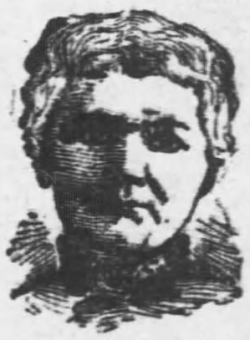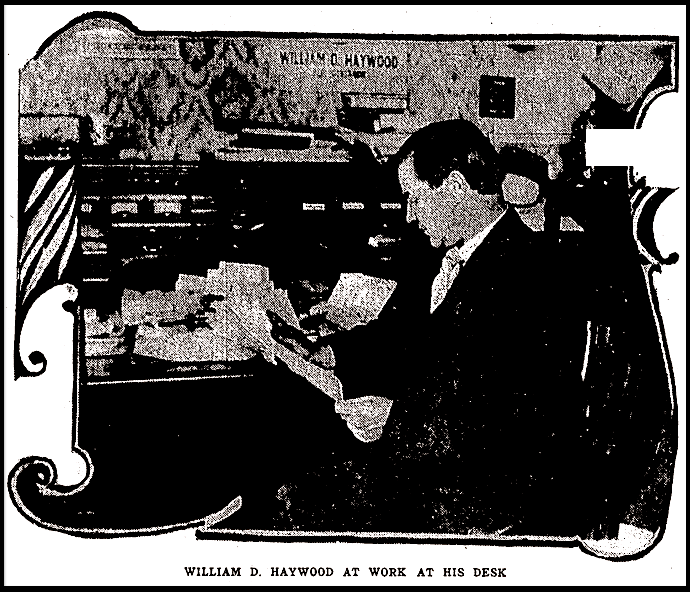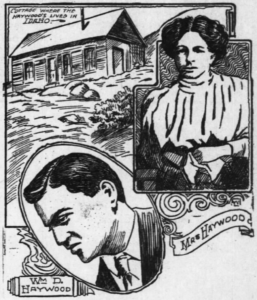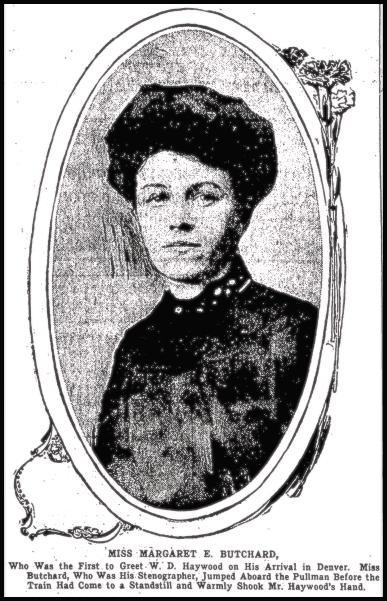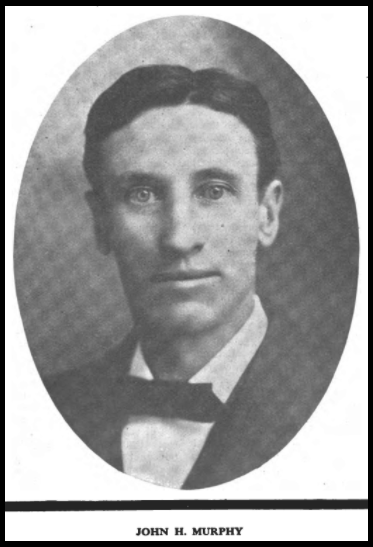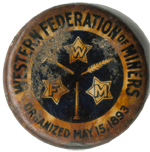A year ago, when I was kidnaped,
some of my friends told me
I would never leave Idaho alive.
But I am here,
and I did not come back in a box,
as they told me I would.
-Big Bill Haywood
Hellraisers Journal, Wednesday August 7, 1907
Denver, Colorado – Mother Jones Visits Big Bill Haywood
From The Rocky Mountain News of August 6, 1907:
MOTHER JONES SEES HAYWOOD
—–
Makes Trip to Denver to Congratulate
Federation Leader.Mother Jones, the famous woman labor leader, made a trip to Denver especially to see and congratulate William D. Haywood on his return home. She paid the secretary of the Western Federation of Miners a call at his office in the Pioneer building yesterday, and they enjoyed a short talk. During the Trinidad strike, and other Colorado labor difficulties, Mother Jones was in Colorado and was as active worker for the union cause.
———-
[Photograph added.]
Haywood Found Back at Work
HAYWOOD, WITH HIS COAT OFF,
BACK AT WORK
—–
Visits Headquarters, Greets Friends
and Attacks Pile of Telegrams.
—–
Walking into the headquarters of the Western Federation of Miners shortly after 9 o’clock yesterday morning [August 5th], William D. Haywood, secretary-treasurer of the organization, stopped at the threshold of his office a moment, looked about him with a half smile, sighed, and said to the score or more of men who rushed to grasp his hands and welcome him back to work: “Well, boys, this seems like old times, dont it?”
He then went into his private office, divested himself of his coat, and settled down to the work of opening and answering a huge pile of letters and telegrams. The effort was useless, though, as his many friends and well-wishers would give him no peace, but continually interrupted him, so at length he gave up all idea of working yesterday and spent the day in greeting old friends.
Haywood declared that in spite of his imprisonment he felt better than ever before in his life. In discussing the labor question, he said that the time is coming in the near future when the labor movement will be better organized than at present, and that united action will be taken by all unions involved in any principle, rather than one union at a time striking and endeavoring to win what he terms a hopeless battle.
[Talks Industrial Unionism]
[He said:]
We see practical demonstration of the futility of simple trades unionism in the railroad strike now on in this city. Here we have one craft giving aid to the employers another craft is fighting, and the result is bound to be the defeat and confusion of the men who are striking. The purpose of the Western Federation of Miners is to secure amelioration of conditions of the workingmen all along the line. A union of unions should be formed, so that the grand union would act on strike orders, as does an ordinary trades union now.
Several offers for lectures and addresses have been made to Haywood, but he has turned them all down, as he intends to live up to his promise to himself that he would not go on exhibition.
Haywood remained quietly at the Albany hotel with his invalid wife and two daughters last night after his day’s work at the office. Several friends called upon him during the evening, but he would not be prevailed upon to go out anywhere, save in the lobby of the hotel. There he was greeted by the guests of the hotel at one time or another during the evening. Nearly all were strangers to him, yet they grasped his hand warmly and congratulated him upon his acquittal.
———-
[Photograph added.]
From The Rocky Mountain News of August 5, 1907:
(Continued from yesterday’s Hellraisers Journal)
Haywood Reaches Home
in a Thunder
of Roaring Cheers
—–[…..]
Throng Barred the Way
The rank and file of the local labor unions crowded about the train which brought Haywood and his party into the station until they formed a barrier to his entrance. so great, in fact, was the crowd which filled the yards, the train-shed and its entrance, that it was full three-quarters of an hour before Haywood, pushing his invalid wife in a rolling chair, reached the Welcome arch, where a carriage was waiting to carry them to the Albany hotel.
But for the serious condition of John Murphy, who arrived on the same train, and Mrs. Haywood, the reception would have known no bound. The sight of Murphy, who is seriously ill with tuberculosis, carried out on a stretcher, followed by Mrs. Haywood in a rolling chair, subdued to a great extent the ovation that had been prepared.
In spasmodic intervals the pentup enthusiasm was let loose, but for the most part those waiting at the station were overawed by the sight of the sick and were satisfied to grasp the hand of Haywood and give him a silent, but warm welcome.
“Hello Bill.” “Hello Bill, God bless you.” “Welcome home, old man,” were the words which greeted him at every step.
Miss Butchart First
It was 10:45 when the train bearing the party pulled into the station, five minutes behind time, and the first one to greet Haywood was his secretary, Miss Margaret Butchart. For two hours Miss Butchart and her mother had been waiting. Hardly had the train come to a full stop before the little woman, dressed all in white, jumped aboard the Pullman in which were Haywood and his party. She greeted the labor leader with a warm handshake and then turned to Mrs. Haywood, lying in a berth across the aisle, and planted an affectionate kiss on her lips. It was a pathetic scene, but the sight of one who has been a close personal friend all her life, and the first to welcome her home, brought a smile to the pale countenance of the invalid wife of the federation secretary and seemed to give her the cheer that she needed after the trials of the past three months.
George A. Hally president of the State Federation of Labor, and chairman of reception committee of one hundred appointed to welcome Haywood home, was the next to greet him. Hally and his committee had forced themselves inside the gates of the train shed an hour and a half before the train arrived. They swarmed about the car which contained Haywood as soon as it pulled in and all were ready to lend a hand in helping the party off. But the labor leader wanted no assistance for himself nor his afflicted wife.
First Thought for Murphy
His first thoughts were for John Murphy. He remained in the car until willing hands had lifted Murphy from his berth and carried him from the train, then picking up his sick wife bodily in his arms he carried her from the car and placed her in the invalid chair that was in waiting on the platform. Even then he declined to entrust her to care of others, but insisted on guiding the chair himself through the crowds and out to the waiting carriage.
Murphy, lying prone on a stretcher and attended by his physician preceded Haywood and his wife through the crowd. Three members of local labor unions. Adam Doerr, W. M. Gray and George Angel, the latter two striking switchmen of the Colorado & Southern, carried the stretcher which bore Murphy.
It was a tedious journey, leading the two invalids through the throng from the train to the vehicles that awaited them out side the arch. Members of the reception committee, with small assistance from the police, went ahead and cleared the way, holding the crowds back. In fact, the police did little to make a way for the sick ones and their attendants. The bluecoats mingled in the crowds, while the members of the reception committee, by entreaty, managed to induce the enthusiastic unionists to hold back.
Women in Front
Two women, Mrs. Ida Mercer, and her daughter, Miss Arline Mercer, preceded the procession through the station, carrying a transparency on which were the words:
Injury to one is Injury to all.
A Red Cross ambulance was waiting to receive Murphy. Mrs. Murphy and the physician also got into the ambulance and the sick attorney was taken to his home.
A carriage hauled by six horses was in waiting just outside the station for Haywood and his family, but the crowd was so great that it was impossible to get to it, and the party was compelled to take the first ones that could be got through.
As though planned ahead of time, Haywood and his wife were brought to a standstill just beneath the arch to get into the carriage that was to take them to the hotel.
There the labor leader picked up his wife in his arms and gently lifted her into the carriage. In the carriage with him were John Edwin Nevin and James Kirwan.
Another carriage followed with Haywood’s two daughters, and after this came an automobile with members of the Allied Trades council, followed by a dozen members of the local brewers’ union carrying an immense American flag spread out across the street.
———-
[Photographs added.]
SOURCE
The Rocky Mountain News
(Denver, Colorado)
-Aug 6, 1907, page 3
-Aug 5, 1907, page 4
http://www.genealogybank.com/
IMAGES
Mother Jones, Mar 11, 1905, AtR
https://www.newspapers.com/image/66992169/
HMP, BBH back at desk, DP p2, August 5, 1907
HMP, Miss Butchard Butchart, DP, p2, Aug 5, 1907
http://www.genealogybank.com/
BBH, Nevada Jane, Leavenworth KS Tx, Jan 5, 1907
https://www.newspapers.com/image/76807856/
WFM, Attorney John H Murphy, Darrow Collection
http://moses.law.umn.edu/darrow/photo.php?pid=1332
WFM button
https://www.nps.gov/kewe/learn/historyculture/museum-guide-5.htm
See also:
Re: Butchard/Butchart
Note: Proceedings of 1906 Western Federation of Miners Convention
has her as Butchart.
(Search with Butchart.]
https://books.google.com/books?id=Q8A3AQAAMAAJ
Emma F. Langdon describes Haywood’s return to Denver and Moyer’s release. Sadly, Pettibone was held for trial:
http://www.rebelgraphics.org/wfmhall/langdon35.html
HAYWOOD HOME AGAIN.
Sunday, August 4, William D. Haywood and party reached Denver just before midnight. Notwithstanding the lateness of the hour it was estimated 10,000 people had assembled and anxiously awaited his arrival to tender a welcome of cheers to the man who had spent nearly eighteen months in an Idaho jail.
It was a day long to be remembered in Denver! As the train steamed into the Union depot the thousands in waiting gave vent to their pent up enthusiasm. Carriages were in waiting and the party were escorted to the Albany hotel where a suite of rooms had been engaged for the family. When the party reached the hotel—cheer after cheer rent the air and cries for a speech followed in rapid succession. The vast assembly simply went wild over the man McParland had said “would never leave Idaho alive.” Haywood, after a brief address that was drowned in the shouts of enthusiasm, mingled with the crowd and upon several occasions was lifted off his feet by the frantic crowd that yearned to grasp him by the hand and congratulate him.
No man in history was ever given a more hearty welcome than William D. Haywood upon his return home to the “Queen City of the Plains.”
PRESIDENT MOYER RELEASED ON BOND.
After a delay of thirty-six hours after the verdict of the jury in the Haywood case, Charles H. Moyer was released from Ada County jail on a bond of $25,000.
President Moyer did not return with the Haywood party. An editorial in the Miner’s Magazine, August 8, explained thoroughly President Mioyer’s attitude better than the writer would be able to do. The Editorial follows:
“Charles H. Moyer and wife did not reach Denver with the Haywood party. The president of the Western Federation of Miners did not feel that the time had come for him to receive the congratulations of his friends. He is yet facing that charge that was made by a combination that feels no scruple in putting a noose around the neck of the man who does battle for the interests of the laboring people. President Moyer has been permitted to enjoy temporary freedom under a bond of $25,000. When he has conquered his enemies and when the doors of an Idaho jail have opened to give liberty to his loyal and staunch friend, George Pettibone, Moyer will then feel that the victory is complete and will enjoy the downfall of the conspiring fiends who attempted to perpetrate the crime of judicial murder.”
“The health of President Moyer and wife is not of the best, and it is probable that he will rest for several days before he takes up the active work of the presidency.”
Long live the President of the Western Federation of Miners Charles H. Moyer!
PETTIBONE REFUSED BAIL
Formal application was made July 30, before Judge Wood to have Pettibone admitted to bail. The motion was submitted without argument and promptly denied. So George A. Pettibone still remained a prisoner in the state of Idaho. No generosity could be felt by the prosecution for the philosophical man who had borne with patience and a cheerful spirit eighteen months imprisonment. But while he was left alone in his prison cell the hearts of all organized labor was with him and pledged their “fortune and their all” in his behalf.
Steve Adams was still held to appease the wrath of corporate despotism but the Federation pledged itself to exhaust every dollar in the treasury, if necessary, in protecting his honor with the others.
Published August 8, 1907 in Miners’s Magazine
by editor John M. O’Neill:
http://www.rebelgraphics.org/wfmhall/langdon34.html
ATTORNEY JOHN H. MURPHY.
John H. Murphy’s part in the struggle is best told by a glowing tribute from the pen of the gifted Journalist and Orator John M. O’Neill, editor Miner’s Magazine, which appeared in the Magazine August 8, 1907.
THE NOBLEST ROMAN OF THEM ALL.
While the Western Federation of Miners is being showered with congratulations, and while Richardson and Darrow, the shining lights of the legal profession, are receiving the highest encomiums of praise for their ability and eloquence as lawyers, yet, when we return to our normal condition of mind after such a grand and glorious victory achieved, we can behold the wan and wasted figure of a man looming up before us, whose very name and work are linked inseparably with the history of the Western Federation of Miners.
The history of the labor movement of this country cannot be written in full without placing the name of John H. Murphy upon its pages. Murphy, the general attorney for the Federation, has made history in every state and territory covered by the jurisdiction of the organization. From the statute books of Colorado, Utah, Nevada, Missouri and other states, eight-hour laws arise as monuments to perpetuate the heroic energy of the man whose advice and counsel have been priceless to the organization that has faced courts, bull pens and deportation. Murphy, the attorney, Is a man who has carved an enviable name and record out of the hard rock of adversity. His youth was not spent in the lap of luxury. As a boy he revelled in no dazzling magnificence, but was among the great army that was struggling for the necessaries of life. In his young manhood, with the bloom and blush of health upon his cheek, we find him upon an engine, serving in the capacity of fireman. But while he was exhausting his physical energies in the battle to secure the necessaries of life, this student upon the engine was communing with Blackstone and other great legal minds that had filled the libraries with the products of their brain.
Murphy, the fireman, became the lawyer, and his heart and soul at once became aroused in a yearning desire to render service to the great mass that were struggling against the wrongs of oppression. In the state of Utah he made his first great fight for the constitutionality of the eight-hour law. With the ablest lawyers which corporations could secure to assassinate the validity of the Utah eight-hour law, Attorney Murphy ultimately won a decision from the Supreme Court of the United States which stamped him as a gladiator in the judicial arena worthy of the best steel.
For four years Attorney Murphy has been in a battle against death. His close attention to his work and the long hours that he has spent in equipping himself to meet the ablest at the bar, has undermined his vitality, and he is now a physical wreck, bravely struggling against the inevitable.
No member of the Western Federation of Miners can forget the services that Attorney Murphy has rendered to the organization.
When the great trial at Boise, Idaho, opened, he arose from his bed of pain, and though the dew of death was gathering upon his brow, he wended his way towards the “Gem of the Rockies” to give his counsel and advice in one of the greatest trials that has ever taken place in this country. Day after day he sat in the court room in the sweltering heat, and though he endured agony of a thousand deaths, yet his loyalty to the organization nerved him for the ordeal. The pale and emaciated face, upon which disease had written the lines of pain and suffering, lighted up with hope and joy whenever the defense scored a point in the great legal battle that had human life at stake, and the future of the militant labor organization of the West.
When Haywood was at last liberated and vindicated by a jury of twelve men, and rushed from the court room to embrace the silvery haired matron at whose knee he once lisped the name of mother; when he had clasped his invalid wife to his breast and folded in his strong arms his two loving daughters, in his great joy he did not forget the brave, fearless little man upon his couch of pain in the hospital who had braved death to be identified in the struggle. In that moment, when Haywood lifted in his arms the devoted attorney of the Western Federation of Miners, and when there broke from the lips of the frail and wasted lawyer, “Bill! In this hour of your great triumph be humble and thankful,” the great, big, whole-souled Haywood must have felt that here is a loyalty that rivals the fraternity of a Damon and a Pythias. In the years that are to come, when memory shall revert to the great trial that has taken place at Boise, Idaho, when men and women shall be paying tributes to the great lawyers who have participated in the battle, the name of John H. Murphy shall shine as “the Noblest Roman of Them All”.
Attorney John H. Murphy passed away, at his home in Denver, March 3. His life had been one of continuous service to organized labor. In the death of this gifted attorney, the workers lost one of their staunchest and most able defenders.

